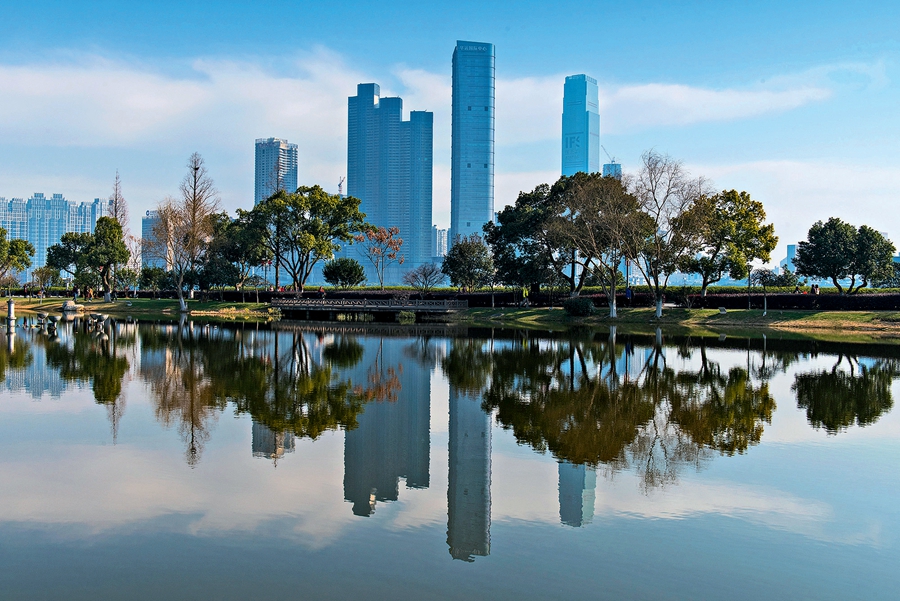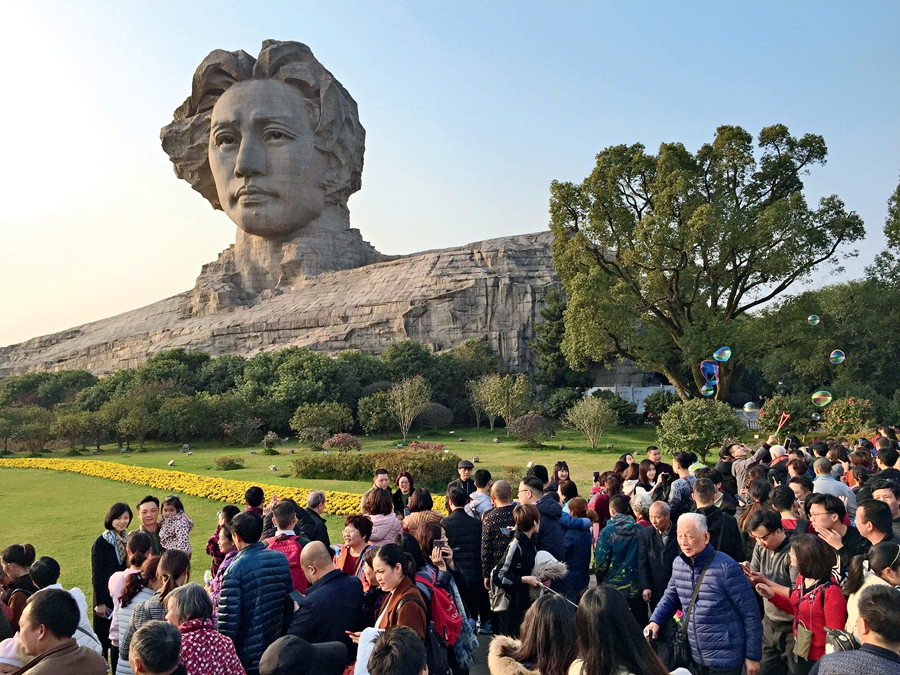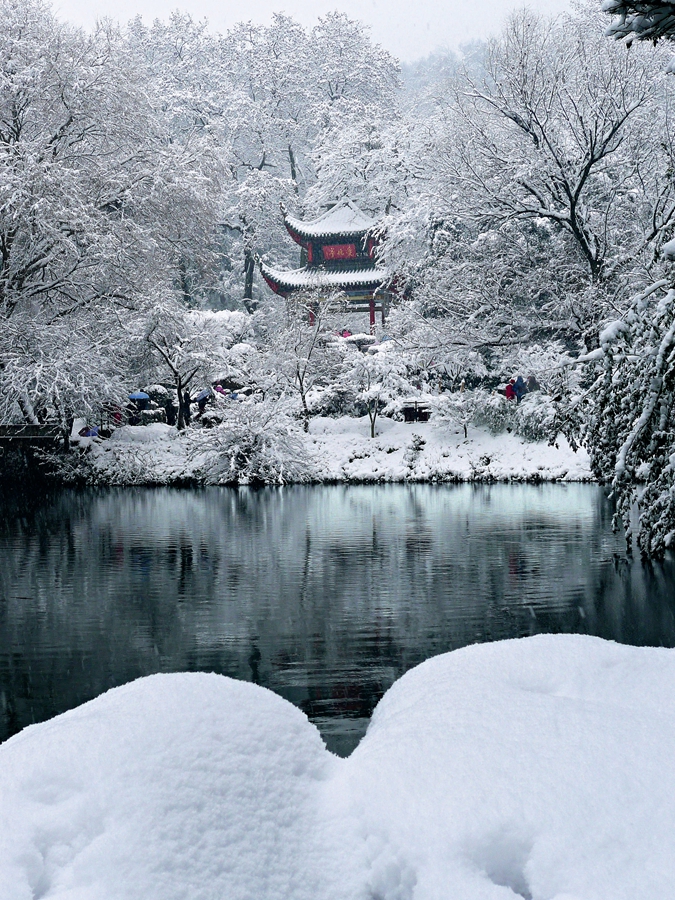A Famed City of the Chu Culture
As early as 3,000 years ago, the name Changsha was well-documented in the history of the Western Zhou Dynasty (1046-771 BC). Changsha, in its infancy, was already an important city in the State of Chu. In 221 BC, after conquering the other six states, Qin made Changsha capital of an eponymous commandery. In the Western Han Dynasty (202 BC- AD 8), the Kingdom of Changsha was established by the central authority.
The State of Chu (1115-223 BC), where Changsha was located, was a vassal state in the Central Plains areas (in the middle and lower reaches of the Yellow River) in the Western Zhou Dynasty. As Chu expanded its territory by waging wars for years, it eventually seized the entirety of today’s Hunan Province and established the city of Changsha as a stronghold in the south. Chu immigrants from the Central Plains areas brought know-how to the south and shared their sophisticated knowledge with the local indigenous people. Together they created the distinctive Chu Culture, which inherited and developed the culture of the Central Plains. The Chu Culture, comprised of art, history, education, literature, philosophy, and folk customs, has become a significant source of traditional Chinese culture, which is mostly derived from the Central Plains areas.

Qu Yuan (339-278 BC), a son of Chu, was the first-ever patriotic poet in Chinese history, the founder of Chinese romanticism, and the creator and representative of the ballad of Chu. Born into aristocracy, Qu was sidelined and exiled due to his political views. When his beloved Chu State was annexed by Qin, he died as a martyr by drowning himself in the Miluo River. Upon the news of his suicide, the Chu people rushed to the river to retrieve his body. They threw rice puddings into the river in an attempt to prevent the fish and shrimp from eating Qu’s body. This was how the Dragon Boat Festival came to be, where customs include people racing dragon boats and eating bamboo leaf-wrapped rice puddings. In 2009, the Chinese Dragon Boat Festival was listed as a UNESCO Intangible Cultural Heritage event.
Qu had a far-reaching impact on Chinese literature. His poetic style immensely enriched the expressiveness of poems, trailblazing a new path in literature. Even today, he continues to be a role model for all writers, for his idealism, his ardent love for his country, his relentless pursuit of truth, and his courage to critique the authorities.
Being a demoted official of Changsha, far away from his king, Qu still worried about the fate of his country and the people. His trips to the Xiangshui and Yuanshui rivers inspired his immortal patriotic poems like Sorrow after Departure and Nine Songs. He was said to reach out to his neighbors and often talk with the locals in the town. He was seen washing his robes by the side of a well in a tranquil alleyway. To commemorate him, the alleyway was renamed Zhuojinfang, which literally means “a place for washing clothes.” To this day, Zhuojinfang alleyway can still be found along Taiping Street, Tianxin District of Changsha.
More than a century after Qu’s death, in the Western Han Dynasty, Jia Yi (200-168 BC), another brilliant yet marginalized statesman, suffered a similar fate as Qu. Removed from the corridors of power and relocated to remote Changsha, Jia was demoted to be the teacher of the King of Changsha, basically a cushy job. He had people build a residence close to the well where Qu Yuan once frequented, put in a stone bed, and planted some fruit trees in the courtyard. For every day of his three-year stay here, state affairs were always on Jia’s mind and he often offered his unsolicited advice on social issues to the emperor. His insights on governance helped the Han Dynasty safeguard its unity.
Qu Yuan and Jia Yi, who both wrote immortal poems and articles in Changsha, left a rich and profound cultural legacy in this city.
Mao Zedong and Changsha
Mao Zedong (1893-1976) was a founding father of the People’s Republic of China who changed the course of the Chinese nation and made an indelible mark on world history.

The statue of Mao Zedong during his youth on the Orange Island attracts many visitors everyday.
Mao was born into a rural family in Shaoshanchong of Xiangtan, about 90 km from downtown Changsha. In his youth, China was experiencing seismic changes and political turbulence. He was influenced by major events like the First Sino-Japan War, the invasion by the Eight-Power Allied Forces, the founding of the Republic of China, the warlord period, and the May Fourth Movement.
In 1911, the 18-year-old Mao came to Changsha, where he studied, joined the military, and became a political activist in the following 10 years. The decade that he stayed in this city shaped his mind, molded his character, built his talent, and paved the way for his rise to national leadership.
In the city for the first time in his life he read newspapers, from which he followed major events and progressive views of this era. It was the newspaper that exposed him to revolutionary ideas and introduced him to the contemporary thinkers and statesman like Sun Yet-sen, the pioneer of the Chinese democratic revolution, Chen Tu-hsiu, one of the founders of the Communist Party of China (CPC), and Hu Shih, an advocate of the New Culture Movement. He soon became a fighter for a democratic China against feudalism and colonialism. He established the Xinmin Institute with his classmates, discussed global issues and state affairs and studied the Russian Revolution, seeking out an answer to save and reform China.
At the time, China, despite the fall of the feudal Qing Dynasty, remained a semi-feudal and semi-colonized society still plagued by foreign invasions and divided by warlords. Mao, who aspired to find a path to save the nation, embraced Marxism and became a firm believer of Communism. In 1920, he led the establishment of the Changsha Marxism Group. In 1921, he attended the first National Congress of the CPC as a representative from Changsha. He was a pioneer and founder of the CPC.
Changsha, as the cultural, political, and economic center of Hunan, was the first city that gave Mao an entrée to see more of China and the world, and empowered him with modern knowledge and revolutionary ideas.
Hub of Media Arts
The GDP of Changsha doesn’t rival that of Beijing, Shanghai, or Guangzhou, but its TV channels have produced numerous popular shows like Happy Camp, which has fueled the local entertainment industry. It is said that for every RMB 10 earned by a citizen of Changsha, seven is spent on cultural consumption. The immense market for cultural products drives the robust development of Changsha’s cultural industry.

Aiwan Pavilion in winter.
“I am Miss Ma from Malan Village of Malan Town in Malan Slope of Malan Mountain.” The pet phrase of Xie Na, a host of Happy Camp, made Malanshan (meaning Malan Mountain) of Changsha a famous community in Hunan and even in China.
Malanshan, located in Kaifu District of Changsha, has remained obscure for many years. In the 1950s, it was part of a big state-owned farm. In the 1980s, it was a farm-garden, best known for the roses it grew. Around the year 2000, Date of Rose, a matchmaking show aired by Hunan Satellite TV and produced right in this former rose garden, was a hit that swept the entire nation.
The fame of Malanshan is intertwined with Hunan TV. In 1994, Malanshan was chosen as the site for Hunan Broadcast & Television Center. Around 2000, the relocation of Hunan Satellite TV and Hunan Economic TV to the region further transformed Malanshan. The old backward Malanshan with muddy roads, ponds, and farmland is gone; the new modern Malanshan, which is now a bustling town with glitzy hotels and restaurants, has become a synonym of fashion and modernity.
Besides TV shows, Changsha also holds the Golden Eagle TV Art Festival, Orange Island Music Festival, and International Sculpture Art Festival, etc. The city has become a creative cultural hub of China, thanks to its emerging culture industry of bigger scales and increasing diversity. A visual creative cultural industrial park with extensive resources and one-stop services is under construction in Manlanshan. A university district and an advertising industry park have also been built to attract talent and creative workers.
(Complied by China Today)